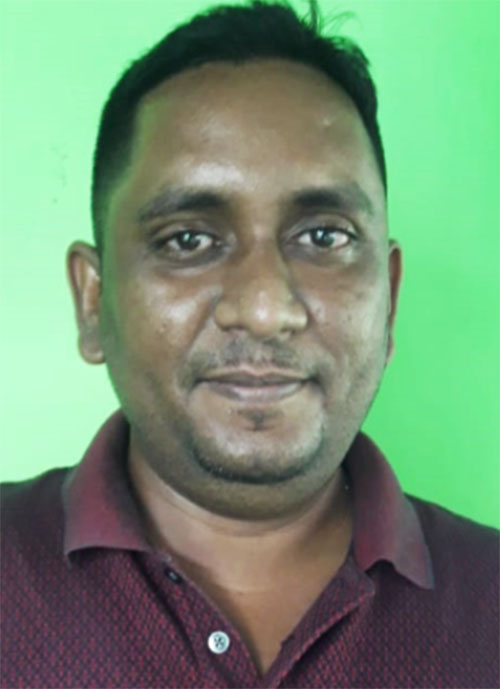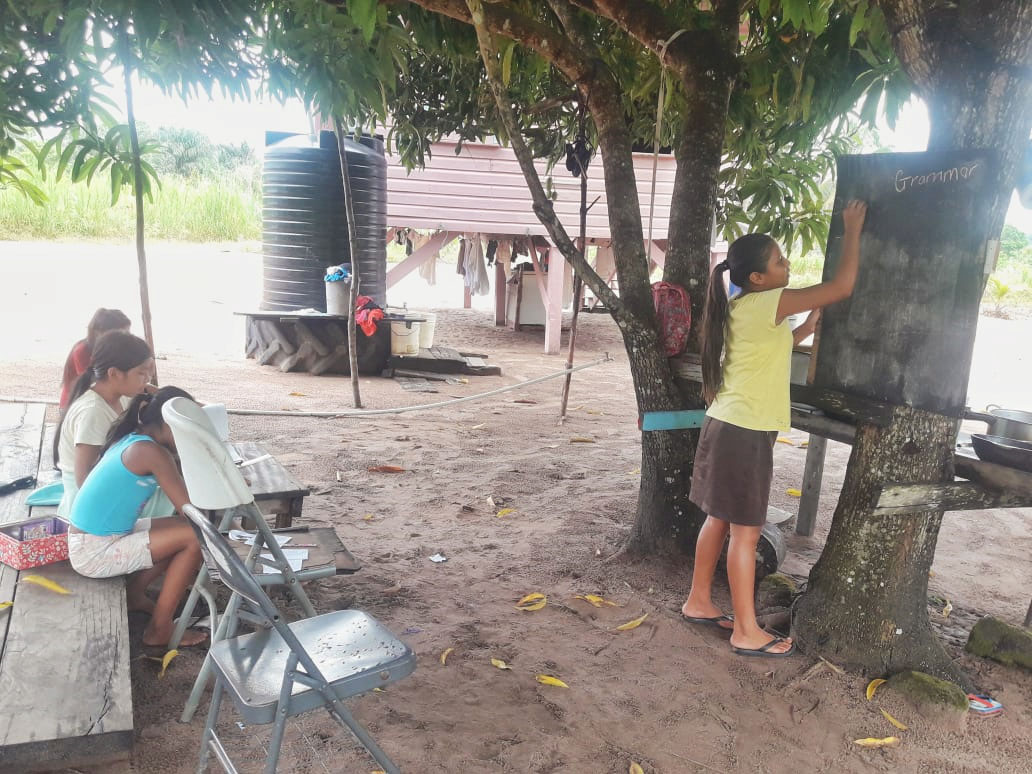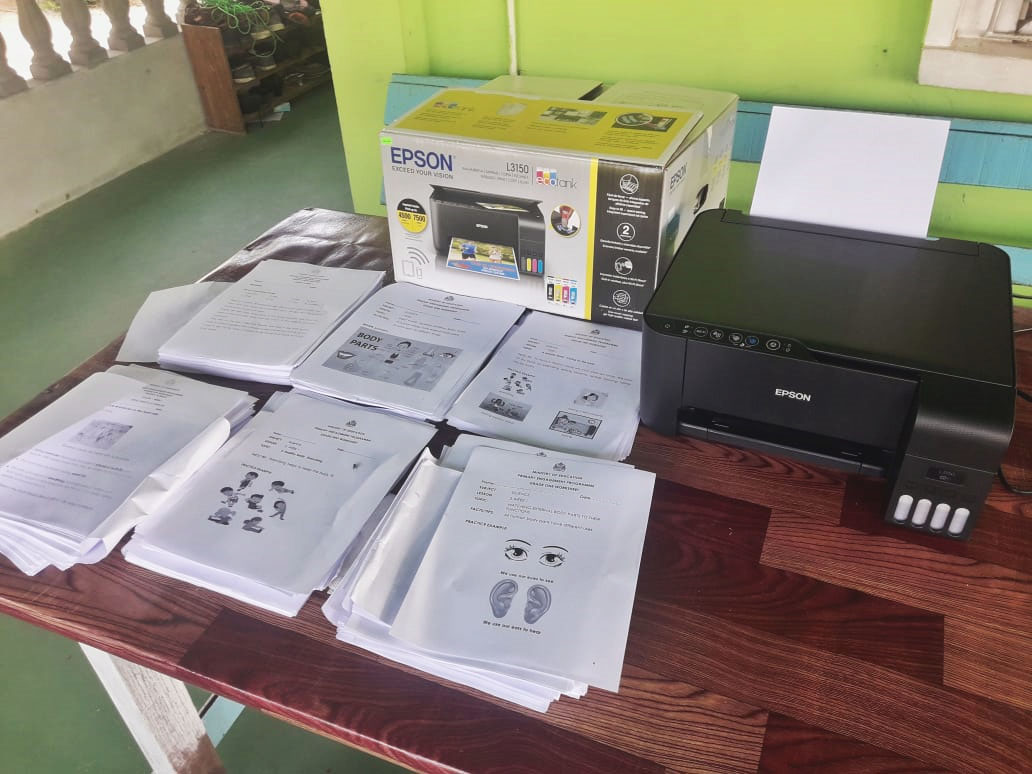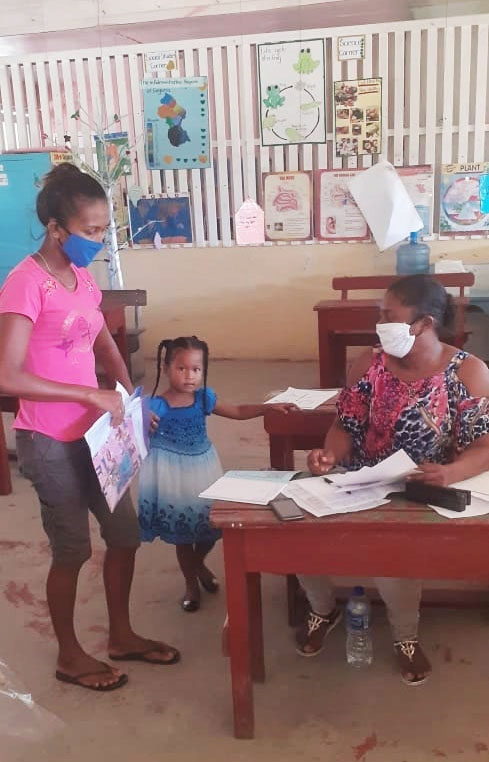The children of Mashabo are among the thousands in the hinterland who have been drastically affected by the coronavirus pandemic. Yet despite the many challenges, their teachers are going above and beyond to educate them in the safest and best possible way they know how.
Mashabo is an indigenous community located across a lake just off of the Essequibo Coast, in Region Two. Although the village is not too far from the coast, many areas in the community have no access to cellular network signals or data.
Headmaster (HM) of the Mashabo Primary School, Modiram Beepat, had just finished installing a brand new printer for the school when he sat down with Stabroek News. Beepat was transferred to the school as HM in September of 2017. After thirty years of no passes at the National Grade Six Assessment (NGSA) from the community, Mashabo finally celebrated two passes for A-list secondary schools when the examination was written in 2018. The following year, there were three passes, while this year, two students achieved passes at the exams. Although the passes were recorded after his arrival, the HM credits the parents of the pupils, and his staff, along with former Peace Corps teacher, Grayson Manzi, who was assigned the Science subject, for the successes. As it relates to Science, Beepat pointed out that since Manzi’s arrival, the school has seen the highest number of passes in the subject at the NGSA examinations.
At the onset of the pandemic in Guyana, following the closure of schools on March 13, Beepat said no virtual education was done immediately, but as time progressed, some three months later, he and his teachers began providing school lessons via WhatsApp. Then, two weeks prior to the writing of the NGSA, school reopened for the pupils sitting the examinations.
Fast forward to the present school term, the teachers of Mashabo Primary have had to find an alternative to teaching their pupils as the first method was not as effective.
“We used to send work to the WhatsApp group but it was very challenging. We [teachers] would send lessons but only one or two parents would reply in the group. When we queried and asked what was happening, they said they didn’t have data. The community centre situated in Hosanna Scheme has WiFi … However, persons at Mashabo Mission where the school is located are unable to use the WiFi. We are advocating for there to be WiFi at the school also. Residents in the scheme have said to us that the current WiFi is not working so I made contact with the regional authorities. They said they would go in and look at it, but to date, it has not been fixed as yet; this was [five] weeks ago,” Beepat relayed. He explained that if the internet issue is fixed, parents can access the work online and also have access to the worksheets posted on the Ministry of Education (MoE) website.
Zoom
Eight of Beepat’s ten teachers reside along the coast and have internet access, therefore he was able to host a virtual meeting with them via Zoom and they were able to discuss strategies on the way forward in educating their pupils.
“We decided to print worksheets. We went into mass printing but we were limited with our printer. Because we don’t have power at the school presently due to issues with our solar panels, I brought the printer to my home and was printing from my home. All the teachers would email their worksheets to me, I will print it, and then we will go into school and distribute it. So, after our meeting we realised we needed a larger printer. We decided to use some of the school funds after calling a meeting with the parents. The one we had before was working with 664 ink (and) was just printing 100 with one ink (cartridge) before the ink would finish. This one has the capacity to print 7,500 prints with one ink cartridge,” the HM pointed out. At present there are ninety-two pupils in the primary and the nursery departments. Every Monday, teachers bring the materials for the four core subjects. For each subject, there are four topics and for each topic, there is a content page, an exercise page, and a homework page.
Disappointment
The head teacher expressed disappointment that the ministry did not follow through with its promise to print worksheets for all of the grades. What they have received from the MoE however, were workbooks for third graders along with past examination papers for the fourth graders. The cost of the printed copies is being covered by the teachers as an out-of-pocket expense in addition to using the school’s funds.
He also expressed concern about the children being able to cover all the work provided within the required time frame. If they cannot, he and his teachers will create a system where they provide work they know their pupils can handle.
Every Monday, Beepat and his teachers travel to Mashabo where they distribute the worksheets. To avoid the pupils turning up at the school for their printouts, parents are required to uplift their lessons for the core subjects which caters for four days of the week. However, because parents are not as versed in the topics, teachers spend the day having one-on-one discussions with the parents, giving them a crash course on each topic so that they can return home to teach their child. Some parents have more than one child attending the school and are therefore tasked with learning double, and for some, triple the amount of work than the average parents have to do. To make their tasks easier, teachers have included on the worksheets, content and examples, a reminder for parents when teaching their children and for the children when reviewing their lessons.
This new method has been ongoing for almost four weeks now. Beepat and his staff are required to provide a weekly report to the education department on the amount of parents they were able to engage as well as the outcome. Thus, Beepat and his teachers would have a weekly staff review to review their successes and examine ways they can improve going forward. It was through this review that a recommendation was made for a better printer. “We would also like for the government to make available tablets for the pupils to use, if not all of them, at least every household,” he said.
Asked how teachers are keeping track of the children’s learning, the teacher explained that each pupil is required to have a folder in which they keep their worksheets, then whenever parents visit the school to uplift the copies of the lessons, they would return the worksheets to be marked. Of course with an entire week’s work having to be taught all in one day, teachers are most times unable to grade the majority of the papers and would take home the children’s work to complete the grading. The following Monday when the teachers return to Mashabo, they not only have to carry the hundreds of new worksheets, but the ones that were graded as well.
Mango tree
The children at the Mashabo Nursery School are also being catered for on Mondays. How-ever, there are no secondary schools in the community. Before the COVID-19 pandemic, students attending secondary schools would have to venture out of the community. Now, with no access to the internet, they are receiving no lessons. When this newspaper visited the community a week prior to meeting Beepat, several of the secondary school students there explained that they have not been receiving work because they do not have access to the internet. One Abram Zuil Secondary student, was seen teaching her younger siblings as well as a neighbour from a blackboard under the shade of a mango tree. It was later learnt that the school was providing work online but secondary school students living in Mashabo were unable to access their lessons.
Beepat who has children in secondary schools on the coast confirmed that his children are receiving their lessons online. However, he feels that it is not as effective and said he would like for there to be virtual face-to- face school via Google Class-room or Zoom at least twice a week to better explain lessons.
One of the school’s major stakeholders is the Guyana-Jamaica Friendship Association (GJFA) which has provided educational resources for the pupils. Mashabo Primary School is the only school in Guyana to have been adopted by the organisation. The GJFA has also visited the school in the past to conduct professional developmental (PD) sessions with the teachers, and to speak with the children. The last time the organization visited, they did sessions on teaching special needs children since the school has several children with learning disabilities.
“This organisation has always been advocating for us to get passes and last year as a motivation, they gave our top NGSA pupil a Chromebook (a laptop operating with the Google Chrome system) as well as $100,000 in cash. This year they have already promised two Chromebooks for the two children that achieved passes for Abram Zuil Secondary. They have also provided us with a number of grade six textbooks and past NGSA papers. They are always asking what it is we need because they want us to be on par with the other primary schools in the country,” a grateful Beepat shared.
Mashabo Primary School has the distinction of being the only school in the country that received a $250,000 grant from Banks DIH last year owing to a recommendation made by GJFA to the beverage company. The grant was as a result of the school’s improved performance at the NGSA examinations. The organisation also encouraged the school to purchase something tangible that would help the pupils, hence the recent acquisition of the printer. The printer, the HM noted, cost $50,000 and there remains a balance of $200,000 of the grant. He is hopeful that they can use the remainder of the grant to purchase a computer for the school along with resources for the various Science classes.
Volunteers
Going forward as it relates to preparing the fifth and sixth graders for the upcoming NGSA exams, Beepat relayed that they were asked by the Regional Education Officer for teachers to volunteer to teach the two levels in a physical class setting. He was one of a number of teachers that have since agreed to do so. In the meantime however, the MoE is still weighing suggestions concerning the sitting of next year’s exams as was pronounced by Education Minister, Priya Manickchand, in a previously published article by Stabroek News.
Among their many challenges in providing an education to the children of Mashabo, another obstacle for the teachers is transportation to the community.
“We have a 75-horsepower engine as the school’s boat but it is not economical for the teachers to use as it requires a lot of gasoline. If we have to pay for gasoline to go into the village with that, at the end of the month, we won’t have any money. So, we are travelling to Mashabo with the community boat which has a 15- horsepower engine which takes forty-five minutes or more depending on the tide. The part I’m not pleased about is that the government is providing gasoline for the boat to transport school children [before the pandemic] and the same gasoline is used to take in teachers and the teachers have to pay. When we questioned it, they said the money is for paying the captain. I heard recently that the region is going to pay the captain a stipend so I’d be happy if they could reduce our cost or we shouldn’t’t have to pay at all,” contended Beepat.
The 75-horsepower engine boat will take an average of 10-15 minutes. Presently, the 15-horsepower engine boat is leaking. Beepat has since written a letter to the education department requesting a new boat. Beepat further explained that because students are no longer in need of the boat, the ministry is no longer providing gasoline which has now seen a rise in the cost to get to and from Mashabo. Teachers pay the return boat fare of $1,000. In addition to this, they have to pay another fare to get from the Essequibo Coast Public Road to the lake, and since teachers live at various villages along the coast, they would have to come up with a separate bus fare to the road that leads to the lake top.
The HM further said that as a result, he is trying to have more residents from Mashabo qualified to teach at the school. Currently, there are two teachers at the school from the community.
“When I started there, there weren’t any teachers. Today we have two persons from the community teaching at the school. By the time, I leave Mashabo, I want the entire school’s teachers to be from Mashabo. We don’t want teachers from the coastland to be there. If anything, maybe one or two, just to guide them along,” the teacher said of his vision for the community.









